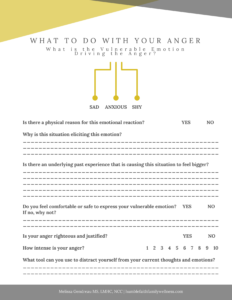
*Disclosure: This post may contain affiliates. Read the full disclosure here.
Angry, mad, irritated, frustrated, agitated, annoyed, irate, enraged, furious, livid, cross, wrath, pissed, etc.
There are many words to describe anger.
And of all the emotions, anger has the worst reputation.
But it is also quite misunderstood.
Where does anger come from?
First, anger is not a primary emotion. Meaning it can’t happen first in terms of emotions. Anger is always the response to one of our more vulnerable emotions (sad, anxious, or shy).
Therefore, anger is an emotion we use as a form of protection or defense towards someone or something.
It is not actually bad in and of itself, however, what we do with our anger is what ends up getting us into trouble.
Proverbs 19:11 (NKJV) The discretion of a man makes him slow to anger, And his glory is to overlook a transgression.
Note: the proverb doesn’t say the discretion of a man makes him stop the anger.
So why does anger happen?
- If we don’t understand the vulnerable emotion.
- When we don’t feel comfortable/safe to discuss it.
- When it is justified and righteous.
- If one of our vulnerable emotions gets too big for us to handle or manage.
Anger then, if we allow it to increase beyond our control, leads to behaviors and outbursts.
Understanding Anger
To figure out what to do with our anger we have to understand it.
Learn the Emotion Underneath
This will help us to address the most basic reason why anger happens – if we don’t understand the vulnerable emotions.
In order to understand and better handle our anger we first need to learn what vulnerable emotion is driving the anger.
[ctt template=”7″ link=”Ves7v” via=”yes” ]In order to understand and better handle our anger we first need to learn what vulnerable emotion is driving the anger. [/ctt]
Are you sad – depressed, down, disappointed, rejected, abandoned, bored, hurt, blue, grieving, forlorn, or lonely?
Are you anxious – nervous, worried, fearful, overwhelmed, scared, frightened, concerned, uneasy, apprehensive, distressed, tense, jumpy, or fretful?
Are you shy – embarrassed, insecure, self-conscious, timid, bashful, inhibited, mortified, or ashamed?
I list all of these emotions because our language pertaining to emotions has seriously diminished and our society is lacking in emotional depth.
Far too often our emotional understanding is described only in the extremes- happy or angry. We then have become accustomed to describing any and all non-happy emotions as some form of anger.
To get you into the mindset of the vulnerable emotions, for one whole week don’t use the word anger or any synonym associated with it.
That doesn’t mean don’t talk about emotions for the week!
Work hard, to be honest, and courageous in acknowledging and expressing the vulnerable emotions.
Once you have a better understanding of what the vulnerable emotions are you can go to the next step.
What is Triggering the Vulnerable Emotion?
This is a big question that often takes time and thorough self-reflection to understand. Not to mention self-control to slow yourself down enough for self-reflection instead of just responding.
Our emotions are gauges based on our thought processes, past experiences, and physical wellbeing. This is how and why our emotions are able to fluctuate so much even over the course of the day.
When we are thinking about our vulnerable emotions is it important to ask yourself three questions:
- Is there a physical reason for this emotional reaction? (tired, hungry, caffeine/sugar crash, PMS, illness, etc.)
- Why is this situation eliciting this emotion?
- Is there an underlying past experience that is causing this situation to feel bigger?
Once we have a better understanding of why the vulnerable emotion is taking place we then can address it before it gets too big that it turns into anger.
If We Don’t Feel Comfortable or Safe to Express the Vulnerable Emotion
This situation and experience are dependent upon our environment. It may be an automatic response or a conditioned reaction to our situation.
For example, if a child is getting bullied they likely aren’t going to feel comfortable or safe to let their bully know he/she is hurting their feelings. Because, truthfully, that’s what the bully wants. So the response is generally to either find a way to avoid the bully or get mad and defend themselves.
This can also happen within a family. If a husband doesn’t respond or listen to tears, a wife will eventually turn to anger as the expressed emotion of choice.
Justified and Righteous Anger
This goes back to the statement that anger in an of itself is not bad.
In the Bible, God is often described as angry. However, His anger is always righteous. It is justifiable. There is a moral reason for His anger.
There are instances we also can experience righteous anger.
For example, I work with many children who have endured horrendous physical and sexual abuse. I am heartbroken and saddened by the pain that these children are experiencing. And the abuse of innocent people makes me angry. It is justified. Harming an innocent person is never morally right.
Now what I do with my anger depends upon whether I turn the emotion into sin or not.
Psalm 4:4 Be angry, and do not sin. Meditate within your heart on your bed, and be still.
How to Handle and Manage Anger
This tends to be where people want to start. But without all of the above information, this is just a behavioral fix that will only be a band-aid to the problem.
That’s not to say that this section isn’t important, but it is incomplete without the emotional and mental understanding of anger.
The tools to be able to address anger also becomes dependent upon how angry you are. The greater the intensity – often the more physical the tool needs to be.
And the tools you use to handle your anger when it is coming from a place of sadness may be different than the tools you use when it is coming from a place of anxiety or shyness.
Tools to handle and manage anger – Anything that distracts you from your current thoughts and emotions!
See, the tools themselves aren’t the key. It’s the understanding of what emotion is driving the behavior and why the emotion is happening in the first place.
I pray this post has been beneficial for you and allowed you a better understanding of both why anger happens and how you can handle it better.

To receive this worksheet in walking through your anger and all of my other worksheets and printables, sign up below to access the Resource Library.
God bless!
Melissa
P.S. Check out all of the beautiful sites I link-up with!

This was fantastic! I teach a class where we talk about anger being a secondary emotion. Most struggle with the concept. I am saving this to refer to later. Thank you!!
Thank you for your kind words Maree! I’m so glad you found the post beneficial. I pray it helps others as well. God bless!
I’ve never heard this before, but would love to learn more. I know when I’m upset with my kids, it’s usually a secondary emotion from being overwhelmed. But last week I was angry because someone stole from my kids. I guess it could have been secondary to hurt, but it felt pretty primary.
Yes, and that would make sense that the anger would feel primary. Remember, anger is defensive and protective of our vulnerable emotions. It can happen very quickly! The anger you experienced was also a righteous and justified anger – stealing is never morally right. Sadness for your children. Disappointment in the person who chose to steal. Even feeling shaken in the security of your children’s property/safety. Anger is the response to all of these things.
The day I learned that it was not wrong to be angry was so freeing for me. And I love that you point out we can’t start with changing the behavior. We are sure to be disappointed we approach it that way.
It can be a freeing understanding when usually the thought is that anger is bad. It’s more about understanding where and why it is taking place and then how to proceed from there. The behavior is always the trickle down effect of our thoughts and emotions. Rarely does behavioral management help by itself. Thank you for stopping by Rachael and sharing your thoughts. God bless!
As I child I remember my mom telling me Anger should be a red flag that there is another emotion I have not dealt with. usually I feel hurt about something or sad and anger is how I lash out. Such good perspective lady!
That’s great advice and way to explain anger and obviously something that stuck with you. Good job mom! Thanks for stopping by and sharing your experience, Tiffany! God bless!
Very educative. Love the expansion of vulnerable emotions. I didnt look at anger in this perspective before. Thank you brilliantly taught
Thank you, Tendayi, for your kind words. I’m glad that you found the post beneficial. God bless!
Once I understood that my anger wasn’t just about them (whoever it was at the moment) I learned to delve into the heart of the matter and get healing. It took me some time, though, to face my own anger. I was very afraid of my own emotions.
Our anger can tend to feel powerful or scary depending upon how we were brought up to view it. But the underneath emotions can be even harder to address and face. Having the courage to explore them and work through them takes significant courage! Thank you for sharing your experience and insight. God bless, Alice!
Good point…..about our vocabulary to describe emotions, seeming diminished. You children will be blessed for their understanding and ability to communicate, no doubt. HUGS precious sister. (pinned of course)
Thank you Tammy! Yes, they do have quite the vocabularies already! 🙂 Thank you for stopping by and sharing! God bless, Tammy!
“Is there an underlying past experience that is causing this situation to feel bigger?” Wow, that is an insightful question as it pertains to anger!
Yes, and often, especially for adults, there tends to by an underlying experience fueling the situation. It takes time and attention to understand and address.
I always tell my son that his emotions aren’t bad, it’s what you do with them that makes it bad or good. I say he can be frustrated when I tell him no, but he can’t be disrespectful with that frustration. Teenagers…hahah
Yes, that’s a very good distinction to help your son make. And unfortunately I don’t think it’s just teenagers! Thank you for stopping by Heather. God bless!
I love this post. I never really thought about anger not being a primary emotion, but when I think about why I get angry, it is always really because I am feeling something else. This is helpful with dealing with my children when they are angry as well. I need to think about what their primary emotion is.
Yes, when we are able to realize other people are experiencing a more vulnerable emotion underneath their anger it helps us to have more empathy for them. That still doesn’t make their negative behavior acceptable but it does help us have more patience in supporting, teaching, and guiding them. Thank you for stopping by Lacy and God bless!
This is helpful! Thank you!
I’m glad you found it beneficial, Elizabeth. Thank you for stopping by and God bless!
Interesting to read, Melissa, that anger has an underlying shyness or fear, something else, which may actually be timid…Thank you.
I’m glad that you found the post interesting, Rita! Thank you for stopping by and sharing your thoughts. God bless!
“[Love] does not dishonor others, it is not self-seeking, it is not easily angered, it keeps no record of wrongs.” Learning to not be offended can go a long way toward not being easily angered. If only our political system could learn this simple rule!
I thought you might enjoy my page about Christians and depression, since you are a mental health therapist. I’d love to know what you think about it. Take a look, if you have the time and inclination: https://o-susannah.com/can-a-christian-have-depression/
If our political system could learn that indeed! Yes, when we are being love and acting in love, we often are not easily angered. Thank you for sharing your page! I look forward to taking a peek! God bless!
This was so good, Melissa. Anger is an indicator that something else is going one. How important it is to get to the root of the issue! You are a blessing!
Thank you, Lori! This is a topic that I am discussing on a daily basis. Helping others to discover and understand what is really causing and driving their anger and outbursts. Taking the time for self-reflection is so important in moving forward. Thank you for stopping by and sharing your encouragement! God bless!